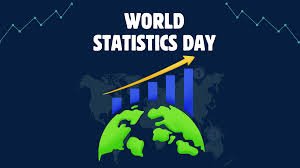World Statistics Day 2024: Date, Theme, History, and Significance
Introduction to World Statistics Day
World Statistics Day is celebrated every five years to highlight the importance of statistics in our daily lives. In 2024, this global event will be observed on October 20. The day aims to promote the role of statistical data in enhancing transparency and accountability in governance and decision-making processes worldwide.
Theme for 2024
The theme for World Statistics Day 2024 is “Statistics for a Better World.” This theme emphasizes the need for high-quality statistics that can contribute to informed decision-making and sustainable development. The focus will be on how statistics can be utilized to address global challenges, including climate change, poverty, and public health.
Significance of the Day
World Statistics Day serves as a reminder of the critical role statistics play in various sectors, from economic development to social welfare. It encourages countries to strengthen their statistical systems to ensure data collection is accurate, timely, and relevant. As nations grapple with complex issues, the demand for reliable statistical information becomes paramount for effective policy formulation.
Historical Context
The United Nations General Assembly established World Statistics Day in 2010, recognizing the need for reliable data to support the 2030 Agenda for Sustainable Development. The first celebration took place on October 20, 2010, and subsequent observances were held in 2015 and 2020. Each event has sought to highlight the importance of data and statistics in driving progress toward sustainable development goals (SDGs) and ensuring that no one is left behind.
Conclusion
As we approach World Statistics Day 2024, it is vital to acknowledge the power of data in shaping our world. By celebrating this day, we are reminded of the need for robust statistical systems that provide accurate information for better decision-making and improved societal outcomes.

Why This News is Important
Understanding Global Statistics
World Statistics Day is significant as it raises awareness about the vital role of statistics in our society. Statistical data influences policies that affect millions of lives, from health care to education, making it crucial for students and future professionals to understand the importance of data literacy.
Impact on Policy and Governance
High-quality statistical data supports effective governance and policy-making. This day underscores the necessity for reliable data systems, particularly in developing countries where data may be scarce. For students aspiring to work in government roles, understanding the implications of statistical data is essential for informed decision-making.
Alignment with Sustainable Development Goals
The theme for 2024, “Statistics for a Better World,” aligns with the United Nations’ Sustainable Development Goals. It emphasizes the role of statistics in tracking progress toward these goals, which is critical for students pursuing careers in public service, environmental science, or social work.
Educational Relevance
The celebration of World Statistics Day provides an educational opportunity for students to learn about data interpretation, collection, and analysis. As future leaders, they will need to navigate a world increasingly driven by data, making this knowledge invaluable.
Encouraging Data Transparency
Finally, this day advocates for transparency in data collection and reporting, which is crucial for building trust between governments and citizens. Students preparing for civil service examinations should recognize the significance of transparency in governance and how statistics play a role in fostering accountability.
Historical Context
World Statistics Day was initiated by the United Nations to promote the importance of statistics in fostering good governance and informed decision-making. The inaugural observance took place on October 20, 2010, marking a global acknowledgment of the role that data plays in development. Each subsequent celebration has built on this foundation, advocating for improvements in statistical systems and the accessibility of data.
The establishment of World Statistics Day aligns with the UN’s broader agenda to enhance the quality of life across the globe through reliable data. The observance is particularly significant in the context of the 2030 Agenda for Sustainable Development, which requires accurate and timely data to monitor progress on various development goals. Over the years, the day has gained recognition as a platform for engaging governments, NGOs, and the private sector in discussions about the importance of statistical data.
Key Takeaways from World Statistics Day 2024
| Serial No. | Key Takeaway |
|---|---|
| 1 | World Statistics Day 2024 is observed on October 20. |
| 2 | The theme for 2024 is “Statistics for a Better World.” |
| 3 | The day promotes the importance of reliable data for decision-making. |
| 4 | Established in 2010, World Statistics Day is celebrated every five years. |
| 5 | The event emphasizes the role of statistics in achieving Sustainable Development Goals (SDGs). |
Important FAQs for Students from this News
1. What is World Statistics Day?
World Statistics Day is a global event celebrated every five years to highlight the importance of statistics in various sectors of society, including governance, health, and economics.
2. When is World Statistics Day celebrated?
World Statistics Day is celebrated on October 20. The next observance will be in 2024.
3. What is the theme for World Statistics Day 2024?
The theme for World Statistics Day 2024 is “Statistics for a Better World,” emphasizing the role of data in addressing global challenges.
4. Why is statistics important in governance?
Statistics provide reliable data that supports informed decision-making, policy formulation, and resource allocation, thereby enhancing transparency and accountability in governance.
5. How does World Statistics Day contribute to Sustainable Development Goals?
The day promotes the importance of accurate statistical data in tracking progress toward achieving Sustainable Development Goals (SDGs), ensuring that policies are evidence-based and effective.
Some Important Current Affairs Links

















